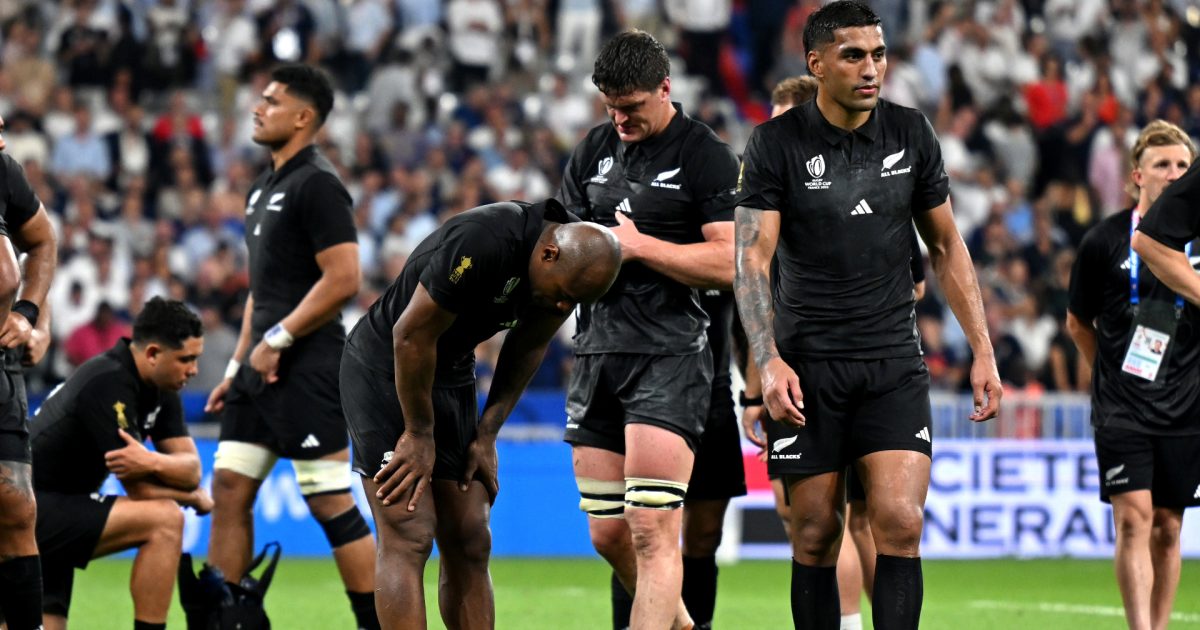Ce qu'il faut savoir sur le match Nouvelle-Zélande - Italie

Aussi étonnant que cela puisse paraître, ce match à Lyon est synonyme de victoire obligatoire pour la Nouvelle-Zélande.
Les All Blacks abordent leur troisième match de la Poule A avec cinq points de retard sur les Italiens et huit sur les Français. Une hypothétique défaite serait synonyme d’une première élimination des All Blacks en phase de poule.
Le sélectionneur Ian Foster a effectué neuf changements dans son XV de départ par rapport à l’équipe vainqueur de la Namibie 71-3. Seuls Ofa Tu’ungafasi, Nepo Laulala, Brodie Retallick, Dalton Papali’i, Ardie Savea et Beauden Barrett conservent leur place.
L’Italie totalise 10 points sur 10 possibles jusqu’ici, à la faveur d’une victoire 52-8 face à la Namibie et grâce à un succès 38-17 face à l’Uruguay. Mais le plus dur commence maintenant pour les Azzurri, tout d’abord avec ce match puis avec une dernière confrontation face au pays hôte, la France, vendredi prochain dans la même enceinte.
Le sélectionneur de l’Italie Kieran Crowley a relégué Niccolo Cannone sur le banc, et a titularisé Dino Lamb, Stephen Varney et Luca Morisi. Alessandro Garbisi et Lorenzo Pani ne font quant à eux pas partie du groupe. Tommaso Allan retrouve son poste d’arrière tandis que Paolo Garbisi passe de trois-quarts centre à demi d’ouverture, son poste de prédilection.
Les Azzurri débordent de confiance avant ce match, mais une victoire face à la Nouvelle-Zélande ferait l’effet d’un véritable séisme.
HISTORIQUE
L’histoire est largement en faveur de la Nouvelle-Zélande sur ces confrontations. Les All Blacks n’ont jamais perdu face à l’Italie en 36 ans. Les deux équipes devaient s’affronter lors de la Coupe du Monde 2019, mais le match avait été annulé à cause du typhon Hagibis. Le score officiel enregistré avait été de 0-0.
MATCH MARQUANT
Les deux formations se sont affrontées lors du match d’ouverture de la toute première Coupe du Monde en 1987, à l’Eden Park. Les All Blacks s’étaient imposés 70-6.
Craig Green, David Kirk et John Kirwan avaient inscrit deux essais chacun lors de ce match. À l’époque, la Nouvelle-Zélande avait inscrit ce qui était le record de points au niveau international. Le deuxième essai de Kirwan, qui avait permis d’atteindre la barre des 50 points, reste à ce jour un des plus beaux essais en solitaire de l’histoire.
Douze ans plus tard, lors de la Coupe du Monde 1999, la Nouvelle-Zélande avait inscrit 101 points et n’en avait encaissé que trois face à ce même adversaire.
POINT CLÉ
Kieran Crowley, qui a remporté la Coupe du Monde 1987 avec la Nouvelle-Zélande, peut-il poursuivre son mandat de sélectionneur de l’Italie jusqu’en phases finales de la compétition ? Vaincre son ancienne équipe serait un succès triomphal pour sa carrière d’entraîneur, mais la tâche s’annonce immense.
LE DUEL
Richie Mo’unga face à Paolo Garbisi. Deux numéros 10 bourrés de talent s’affrontent dans ce match crucial pour les deux équipes. On en redemande !
LA STAT INCROYABLE
S’il vient à entrer en jeu, Sam Whitelock deviendra, devant Richie McCaw, le All Black le plus capé de l’histoire avec 149 sélections sous le maillot à la fougère. Ce serait également son 22e match de Coupe du Monde, il égalerait ainsi le record codétenu par McCaw et l’Anglais Jason Leonard.
L’ARBITRE
Matthew Carley (Angleterre). Aucun arbitre n’a plus levé son bras pour signaler un essai dans ce tournoi que Carley : 22 fois en deux matchs. Il a arbitré la large victoire de la France, teintée de 14 essais, 96-0 face à la Namibie, ainsi que le succès 32-26 du pays de Galles face aux Fidji lors du premier week-end de la compétition au cours duquel les deux équipes ont inscrit quatre essais chacune.
LES ÉQUIPES
NOUVELLE-ZÉLANDE : Beauden Barrett ; Will Jordan, Rieko Ioane, Jordie Barrett, Mark Telea ; Richie Mo’unga, Aaron Smith ; Ofa Tu’ungafasi, Codie Taylor, Nepo Laulala ; Brodie Retallick, Scott Barrett ; Shannon Frizell, Dalton Papali’i, Ardie Savea (cap.).
Remplaçants : Dane Coles, Tamaiti Williams, Tyrel Lomax, Samuel Whitelock, Sam Cane, Cam Roigard, Damian McKenzie, Anton Lienert-Brown.
ITALIE : Tommaso Allan ; Ange Capuozzo, Juan Ignacio Brex, Luca Morisi, Montanna Ioane ; Paolo Garbisi, Stephen Varney ; Danilo Fischetti, Giacomo Nicotera, Marco Riccioni ; Dino Lamb, Federico Ruzza ; Sebastian Negri, Michele Lamaro (cap.), Lorenzo Cannone.
Remplaçants : Hame Faiva, Ivan Nemer, Simone Ferrari, Niccolo Cannone, Manuel Zuliani, Toa Halafihi, Martin Page-Relo, Paolo Odogwu.


